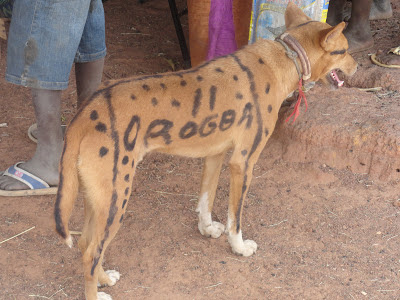This morning concluded a five-day bike tour of Donga, a region in western Benin. I traveled with a group of volunteers to 13 villages to lead educational sessions on malaria and savings. The total attendance at our sessions exceeded 1100 people. The route was planned so that we spent each night in the village of a different Peace Corps volunteer in the region. We slept on the floor of those volunteers' houses on thin mats that we carried with us.
The trip also afforded me the opportunity to discover a part of Benin that was previously unknown to me. Below are some pictures of our bike tour and the region.
The trip also afforded me the opportunity to discover a part of Benin that was previously unknown to me. Below are some pictures of our bike tour and the region.
 |
| On the road to Manigri. Most of our route was paved, but parts were on dirt roads like this one. |
 |
| The sacred monkey forest of Kikele. The monkeys, like the one pictured here, made a racket as they leapt from tree to tree. |
 |
| This monkey in Kikele is available for sale. He is not of the same variety as the larger monkeys in the forest. |
 |
| This grain storage container is typical of the region. Some buildings in the region also use the same construction materials and have similar roofs. |
 |
| The women of Bodi sing a song of thanks to Kelly (far left), the Peace Corps volunteer who lives in their village. |
 |
| Erin (in red in the center) presents to nearly 200 people in this small village. |
 |
| The day after the African Cup soccer final, we saw this dog bedecked with the name of a Cote d'Ivoirian soccer player. Burkina Faso lost the match to Nigeria. |


The grain storage unit looks like the bottom half of an elephant!
ReplyDeleteI'm amazed at the number of people who turned out for these sessions. Hopefully, you will have reached the majority of them.
ReplyDeleteHow about a pet monkey? :)
What was the Italian priest's approach to development?
Jean Ralley
The priest thinks that the most valuable contribution that the West can provide to Benin is construction projects. He criticized Peace Corps for focusing so much on education and training and for not providing more money for construction. We told him that Peace Corps is different from other US agencies that focus on providing money and materials. Peace Corps' main goal is education, and we follow the teach-a-man-to-fish philosophy.
ReplyDeleteThe priest had done a lot of construction in his village: wells, a school, the cultural center, stores for handicapped people, a garden, etc. I wondered how many of those things the community had asked for and how many were projects he invented himself. Beninese villages are full of relics of foreign construction projects that didn't pan out because the local community wasn't sufficiently implicated in the planning and implementation. The priest mentioned that his cultural center hasn't been successful so far, and I wonder if that's because it's entirely based on his vision and he never consulted the Beninese when building it. It seemed that the priest is promoting a development model that teaches the Beninese that they don't have to work to build up their own communities because the West will do all the work for them. Peace Corps' approach is to empower communities to be responsible for their own development.
Since I am a health volunteer, I asked the priest if he accompanies his well construction projects with education about how to make well water safe for drinking. The priest insisted that well water is perfectly safe for drinking because the Beninese have a natural immunity to diseases it may contain. That is patently false, but that wasn't the only time that the priest made erroneous health claims.